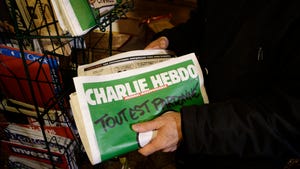France’s Demographic Bad Luck: The Jews are Fleeing and the Muslims Refuse to be French: Glenn Harlan Reynolds
http://www.usatoday.com/story/opinion/2015/01/19/paris-jews-french-population-muslim-immigration-europe-column/21959089/
Throughout history, poverty is the normal condition of man. Advances which permit this norm to be exceeded — here and there, now and then — are the work of an extremely small minority, frequently despised, often condemned, and almost always opposed by all right-thinking people. Whenever this tiny minority is kept from creating, or (as sometimes happens) is driven out of a society, the people then slip back into abject poverty.
This is known as “bad luck.”
I was reminded of this quote while reading about the ongoing diaspora of France’s Jewish community. Though French Prime Minister Manuel Valls says that if 100,000 Jews leave France, the country will be “a failure” and “France will no longer be France,” that once-inconceivable outcome now seems entirely likely.
France has the largest Jewish community remaining in Europe, but Norman Lebrecht, a French Jew whose family has been in France at least since 1727 (when the first records exist), decided last week that he is leaving. Nor is he alone.
As Jeff Jacoby observes: “In 2012, there were just over 1,900 immigrants to Israel from France. The following year nearly 3,400 French Jews emigrated; in 2014 approximately 7,000 left. For the first time ever, France heads the list of countries of origin for immigrants to Israel, and the ministry of immigration absorption expects another 10,000 French Jews to arrive in 2015. That would mean more than 22,000 Jews fleeing France for Israel in the space of just four years, nearly 4.5% of the country’s Jewish population.” Many others are leaving for Britain, America and Canada.
Like this column? Get more in your e-mail inbox
French Jews are leaving for two main reasons: because they don’t feel welcome, and because they don’t feel safe. They don’t feel welcome because a rising tide of anti-Semitism has poisoned the atmosphere in France over the past couple of decades. It’s not so much the old anti-Semitism of the pre-War variety as a new anti-Semitism brought on by a wave of Muslim immigration, though the two have reinforced one another.
And they don’t feel safe because of attacks on Jews. As the Chief Rabbi of France, Haim Korsia, notes, it’s not just last week’s attacks on a Kosher deli and on the Charlie Hebdo news weekly: “Jews have been killed and there were the shootings in Toulouse and in Brussels. In general, Jews feel vulnerable in our society. The Jews who were murdered were targeted specifically because they were Jewish.”
It’s gotten bad enough in France, and in Europe generally, that one of Europe’s leading rabbis thinks that Jews should carry guns, and wants the laws changed to make that easier. That’s not a bad idea, but I’d be surprised if it got much traction.
A hundred years ago, France — and Europe as a whole — had a large, highly educated, and mostly assimilated Jewish population. A wave of anti-Semitism, culminating in the Holocaust, led to millions being killed, and many of the rest fleeing. Europe was weakened as a result. (One of German’s big scientific weaknesses during World War II was that it had chased off most of its leading scientists, many of whom wound up working on America’s Manhattan Project; Jews who might have helped with Europe’s postwar recovery were mostly dead or elsewhere.)
Now European nations are facing population deficits, and they’ve replaced those missing Jews with Muslim immigrants who — unlike the Jews — are for the most part far less educated, don’t really consider themselves part of European society, and have no particularly strong desire to integrate into it, which bodes poorly. As Eugene Volokh — himself an immigrant to the United States — observes, in a democracy, when you let in immigrants, you are letting in your future rulers.
One can hope that all of this will end well regardless, and I certainly do hope so. But others fear that Europe is partying like it’s 1939, something made worse by continuing economic problems, and the history of European institutions in dealing with such stress over the past century hasn’t been exactly brilliant. My sad prediction: Europe is facing a spell of “bad luck.” May it prove mercifully short, and, perhaps, educational.
Glenn Harlan Reynolds, a University of Tennessee law professor, is the author of The New School: How the Information Age Will Save American Education from Itself.
Comments are closed.


